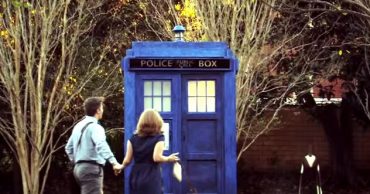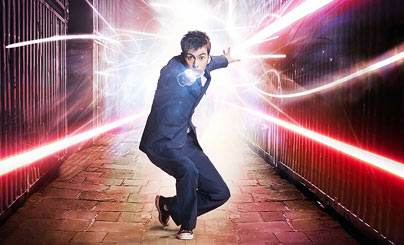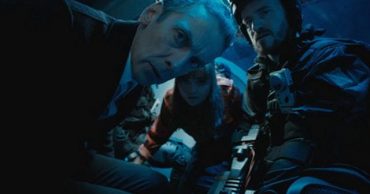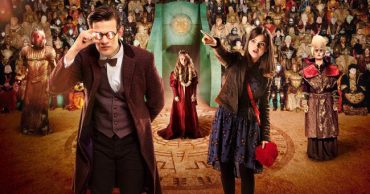 “Let’s Kill Hitler” was the best episode of Doctor Who series 6 so far. The midseries premiere aired Saturday night and was, from start to finish, one of the most satisfying outings the Doctor, Amy, and Rory have ever been on. Writer Steven Moffat took about ten questions from the show’s ongoing story arc and answered them without making the episode feel rushed or disjointed. It was a cracker of an episode, as star Matt Smith might say.
“Let’s Kill Hitler” was the best episode of Doctor Who series 6 so far. The midseries premiere aired Saturday night and was, from start to finish, one of the most satisfying outings the Doctor, Amy, and Rory have ever been on. Writer Steven Moffat took about ten questions from the show’s ongoing story arc and answered them without making the episode feel rushed or disjointed. It was a cracker of an episode, as star Matt Smith might say.
The relative lack of Hitler was actually quite welcome. He was just a catalyst for plot development; the episode needed him to introduce the Teselecta and then unceremoniously shoved him in a cupboard (providing one of Rory’s best scenes).
By contrast, the new character Mels turned out to be one of the highlights of the episode. As my fellow TVOvermind staff writer Paul Kerton so wonderfully put it, it seemed at first as though the episode had “just dropped a LOST-style Paolo and Nikki on us.” Mels seemed retconned in as a previously unseen best friend who would now prove to be important. And, to an extent, she was. But when one of the episode’s first twists was revealed — that Mels was actually a previous incarnation of River Song — it didn’t feel forced at all. It worked.
In fact, this episode really was a fill-in-the-blanks page for River’s biography, giving us information about her regeneration in New York (as seen at the end of the season’s second episode, “Day of the Moon”), why she became an archaeologist, and why she didn’t regenerate at the end of “Silence in the Library” (I had thought it was because the electrical surge that killed her would prevent regeneration anyway).
The episode answered all those questions, though, by creating more questions. Namely, what is the oldest question of all? The Teselecta’s records didn’t seem to know the question. Personally, I looked at it from a purely literal standpoint. The first question that the show ever asked us is right there in the title: “Doctor Who?” We know that at some point River has to find out the Doctor’s name. Will that cause the Silence (revealed in a very cool way to be not just a species, but a sort of sect) to finally fall? I’m just wildly speculating, but I like that line of thought.
If I did have one qualm with the episode, though, it’d be the same qualm I always have with Moffat’s writing: predestination paradoxes. Though I appreciate Moffat’s eschewing of typical time travel tropes, predestination paradoxes always seem to fall apart when you look at them. For example: Amy named her baby Melody because she named her baby Melody. Another: River takes up her new name because the Doctor told her that at one point in the future she would take up that name. It doesn’t make much sense if you think about it. Perhaps I’m too firmly rooted in the common sci-fi conception of the way time works.
All in all, though, “Let’s Kill Hitler,” was Doctor Who in fine form. Moffat provided answers and new questions in a way that didn’t feel cobbled together or frustrating. That’s a rare feat for any television show, making “Let’s Kill Hitler” well-worth the watch. A
Doctor Who will return next Saturday with the episode “Night Terrors” on BBC1 in the UK and BBC America in the US.
 Follow Us
Follow Us






I thought of both those questions myself, although I think they are ultimately more of a bootstrap paradox than a predestination paradox, since the problem is less that River Song's names were given to her by people from the future of her own timeline and more "where the hell did those names come from in the first place?"
I tend to hand wave this problem as I enjoy well handled versions of it from a narrative perspective, but I have come up with a generally applicable solution to the problem that let's me do so without feeling like I cheated with the laws of cause and effect.
Let's say a time traveler goes back and changes something. Let's say he was originally named Jerry, and as a result of his trip back, his parents win up naming him Harry. Growing up with the name Harry will produce at least slightly different life experiences compared with growing up as Jerry, so if/when Harry goes back, he'll behave slightly differently than he did/would have as Jerry. This results in his parents naming him Gary. This continues until, say, Larry makes substantially the same changes as Gary, resulting in his parents still naming him Larry, and the timeline settles into a stable loop where it ceases to change and the name Larry seems to have arrived from nowhere in particular. Since the timeline can go through an infinite number of altered loops without "losing" any time, eventually something will produce a stable timeline, which is what will ultimately become permanent history, but may have ontologically ambiguous information or objects produced by previous, overwritten, timelines.
That's how I justify this sort of thing in my head.
I think they deflected the whole "lifelong best friend we never mentioned before", by actually having the Doctor mention it himself. The truth is she was at the wedding. It was just her later incarnation, River, who showed up.
I watched this episode in light of "A Christmas Carol." In other words, the reason we had never heard of Melody before was that *she wasn't there before.* When we have seen their lives, we have seen a previous timeline, where their daughter hadn't traveled back in time to grow up with them. ("Your memories are going to change, you'll get the hang of it.") I didn't take it as them trying to make us accept that she was there all along even though we'd never heard of her before, but that she wasn't there all along until she looped back in time and made it so.
The only problem with the changing timeline stuff is that the show's never worked like that before – indeed, quite the opposite: until Fires of Pompeii happened, and the Doctor destroyed the Pyrovilles, then up to that point Earth would have been populated with stone beings. The UNIT years would have been different for a start! Sgt Rock, anyone?!
Lets Kill Hitler wasn't bad. I'm not sure I like the constant going back in time and changing things so you have different memories. Just like in "A Christmas Carol" where the Doctor jumps forward / backward in time to get a code, doesn't work with me…
My one itty bitty complaint and this is me being petty. But since when can Time Lords change races? Mels was black (or part black), so how does she change to being white? I've never seen any of the pre 2005 Time Lords change from snooty old white guys to sharp dressing Latinos!
And… and, (last one) why did they drive all that way in the crop circles to spell the Doctor? And to find him? Like, what was the point? Not a showstopper, just curious..
I kinda agree that Hitler was kind of wasted. They could've gone back to present day or ANY time period and had the exact same story. I do like seeing ancient characters and it would've done well to see an ancient villain, as well.
The Justice Serving Robot was good (I get tired of seeing doubles of main characters though), Rory continues to be my favorite character I think. But yeah, a decent episode, which seems to be my new Doctor Who standard these days.